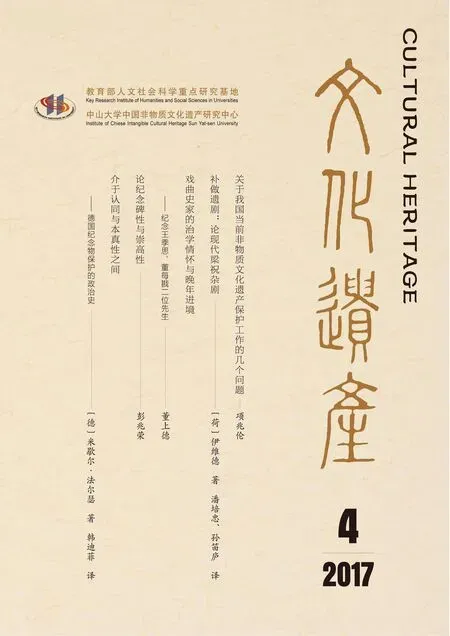Main Abstracts
2017-01-29
Main Abstracts
The Study Faith and Later Life of Two Drama History Professors: In Memory of Professor Wang Jisi and Dong Meikan
DONGShangde1
2017 is the 110th anniversary of the birth of Wang Jisi and Dong Meikan, who are the main pioneer of the traditional Chinese drama history discipline of Sun Yat-sen University. This article will review and analyze the study faith and later life of the two professors. Professor Wang Jisi is a scholar with a whole world in mind. He put himself into the tension between history and reality, and found the sense of presence in the relationship between historical consciousness and real feeling, so as to make himself connect with the reality. This is what he different from the general scholar. Professor Dong Meikan devoted himself to constructing the theory of “dramatic hermeneutics” in his later life. The basic of “dramatic hermeneutics” is digesting literariness and play, and the interest of it is to communicate with the research object while interpreting. His book “Research of Five Famous Dramas” is the most important achievement of his “dramatic hermeneutics” theory. Professor Wang and Dong have laid an academic foundation for the traditional Chinese drama history discipline of Sun Yat-sen University, and also pointed out the academic direction. Today, their academic contributions are complementary.
Making Up for a Loss: Modern Zaju on “Liang Shanbo and Zhu Yingtai”
WrittenbyWiltL.Idema,TranslatedbyPANPeizhongandSUNDilu7
In the 1920s and 1930s several scholars continued to write zaju in the style of the Yuan Dynasty. At the same time the legend of Liang Shanbo and Zhu Yingtai was widely discussed. So it comes perhaps as no surprise that we have two Zaju adaptation of this love story from this period. The first play was written by Chang Renxia in 1931, and the second by Gu Sui in 1936. Whereas Chang’s play is composed in a very simple style, Gu Sui’s arias are very elaborate. Both playwrights hailed from northern China, and their version of events departs in some ways from the better-known versions from the Jiangnan area: in both cases Zhu Yingtai has dressed as a boy at the insistence of her parents. Chang Renxia also borrowed some elements from a short article by the Henan-born scholar Feng Yuanjun on the legend, which also may have influenced Gu Sui, whose work also shows some Western influences.
Some Issues of the Current Protection of Chinese Intangible Cultural Heritage
XIANGZhaolun41
The protection of intangible cultural heritage in China has gained remarkable achievements, and is now going to a new level. The inheritor is the main subject in the heritage recognition, protection, and inheritance. The vitality of intangible cultural heritage comes from the inheritance and promotion of outstanding traditional culture during practice. To basically protect intangible cultural heritage, we should protect the inheriting practice, ability, and environment. The inheriting and practice ability of the inheritor may directly relate to the sustainable development of intangible cultural heritage in the changing environmental. Academic research is an important part of the inheritance of outstanding traditional culture, which is indispensable for improving the inheritance and development level of intangible cultural heritage.
Monument and Sublime
PENGZhaorong69
In the types of the landscape, the monument usually appears as the political landscape. However, as one of the special architectural form and symbolic system, the monument presents huge differences in the meaning and content in western world and China. If the function of the monument in the western world is the monumentality, then in china is the sublime.
Between Identity and Authenticity: To Political History of Preserving Memorial Monuments in Germany
WrittenbyMichaelS.Falser,TranslatedbyHANDifei75
This article is the introduction of the author’s doctoral dissertation, in which the dissertation topic is generally introduced and the research in terms of range, significance and methodology are mainly discussed. To concerns about the memorial preservation and the confronting crisis of the corresponding institutions, starting discussion from the political context, based on theories of semantics and semiotics to analyze the socio-cultural functionality for memorial preservation, definition of the related concepts such as National Identity, Nationalism, Memory, Authenticity, Tradition and Myth, their relationship to memorial protection is represented.
